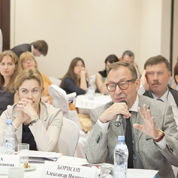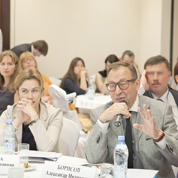The pros and cons of calls for assets deoffshorization for businesses
Issue:
September 2013, Vol. 9
Tags:
Deoffshorization

Earlier this summer, the Moscow Marriott Grand Hotel hosted a Financial Five O’Clock Event, titled, “The Offshore Havens: The new rules of the game in Russia and across the Globe.” The after-business event was organized by ACG Gradient Alpha with the support of the Expert Taxation Council of the Russian Chamber of Commerce and Industry.
The Financial Five O’Clock get-together is Gradient Alpha’s traditional event, which is usually held as a private meeting over cups of tea after business hours. Apart from media, the representatives of leading Russian and foreign companies, such as LUKoil, Sberbank, Sistema, Inter RAO UES, Metalloinvest, TMK, The X5 Retail Group, Julius Baer, UHY Hacker Young, Latvia-based Rietumu Bank and others took part in the meeting.
In Russia and across the world, 2013 has become a year of de-offshorization. The experts at the event, both from the business and political aisles, see Cyprus as the first victim of the fast-increasing de-offshorization trends. The key speakers reviewed the trends in Q1’2013, shared their views and exchanged opinions about different offshore havens and their expectations from market players, taxation officials and other industry regulators.
Taxation officials setting new political summit agenda
Addressing the meeting, Russian Federal Taxation Service (RTS) Deputy Director Alexei Overchuk noted that deoffshorization of economy is a global trend. “In 2012 such large global companies as Google and Amazon made profits of about GBP7.6bln in the UK, but did not pay a penny in taxes in the country. Also, between 2008 and 2011, US’ Top 10 largest companies had siphoned over $1.5trln off into different offshore havens across the globe, he added.
Another negative trend, according to Overchuk, is that while tax burden increases, the largest corporate giants usually do not pay more in taxes, as expected. On the contrary, it is the relatively smaller and mid-cap entities and individuals that usually bear the lion’s share of taxation increments. “This is why the Great Britain, as the current G8 chairman, has made fighting tax evasion one of the key issues of its agenda,” the official noted.
“FATCA is a revolutionary act, which is being perceived with extra caution due to its supranational feature because it is seen as the US attempt to once again impose its domestic policy on the whole world.”
In waging such war, governments are aware that, in the era of economic globalization, free movement of goods and capital across countries without economic boundaries, it will be unwise, difficult, or even impossible, to solve taxation evasion issues within national jurisdictions. It is, therefore, imperative that international cooperation of national taxation services be developed among countries, he added.
Overchuk cited the ongoing information exchange between the RTS and those of the OECD countries as an example of sought cooperation. The results of the OECD conference, held in Moscow in May, would influence Russian businesses in this aspect. The conference discussed the same issues that were later featured at the G8 Summit in Lough Erne on June 17-18 and the same issues will also be on the G20 Summit’s agenda in St. Petersburg in September.
One of these issues, reflected in a document, titled, “Base Erosion and Profit Shifting,” is devoted to reduction of taxable bases and siphoning of assets to jurisdictions with lower tax requirements, Overchuk explained. The document calls for an exchange of financial information, control of transfer prices, e-commerce, taking into consideration its non-attachment to any jurisdiction, and other non-material assts, he added.
According to Overchuk, OECD is presently in the process of adopting a policy of automatic exchange of information between member countries. This policy will be anchored on the US’s Foreign Account Tax Compliance Act (FATCA), expected to be its driving force.
Offshore legislation novelties: an EU bank’s view
Yaroslav Zamullo, the head of legal department at the Latvia-based Rietumu Bank, explained the view of the bank on offshores as a player operating on the EU financial services market. He sees strengthening of legislation on controlling of companies as the main focus in the anti-offshore regulatory system over the last five years across the EU. This means that any company registered under the name of an EU resident on paper with just a bank account that is involved in any real economic activity or has traditional attributes of a standard firm (office, management) or registered in an address with 1000s of others, then such firm is taxed at the same rate as an individual citizen. In other words, all payments routed through the firm are deemed as incomes of the account holder and taxed accordingly, the corporate lawyer explained.
 The second focus of some global anti-offshore regulation is putting limitations on opening foreign bank accounts. But this is impossible within the EU as it is a signatory to the principle of free movement of goods and services, he added.
The second focus of some global anti-offshore regulation is putting limitations on opening foreign bank accounts. But this is impossible within the EU as it is a signatory to the principle of free movement of goods and services, he added.According to Zamullo, FATCA, on one hand, is a revolutionary act, while at the same time it is being perceived with extra caution due to its supranational feature, on the other. This is because it is seen as the US attempt to once again impose its domestic regulations on the whole world. “Specifically, the FATCA requirements are seen as controversial in the EU that has penalties for disclosure of bank secrets. This has led to a serious debate about how to enforce this law and other international norms in EU, while at the same time not losing clients, infringe on their rights and business interests.”
The Latvian banker also shared his opinions on Cyprus and other equally risky offshore alternatives, as well as on their pros and cons, the possibilities and threats of using them. He went on to offer practical recommendations on how to choose foreign banks and corporate jurisdictions for businesses so as not to fall victims of these shortcomings.
“It is necessary to choose a bank and not a country. Besides, companies need to diversify the financial or credit entities they use: choose one bank for payments, another for keeping assets, a third as a source of loans,” he advised. “Also, it is important to fully understand banks’ requirements for opening accounts and indicators of its state of health and activities. Such factors as bank’s loyalty to clients, its language and technology should be taken into account.”
Use of offshores in Russia
Russian businesses, compared to Western corporations, most often do not use offshores only for tax optimization, but also a means of property protection. Collaborating this point, Gradient Alpha Chairman Pavel Gagarin cited the results of the East+West=Invest conference audience survey conducted by his company. According to this poll, 140 business owners and CEOs from different industries and regions were asked the following question: “Why do Russian companies use offshores?”
An overwhelming majority (86.4%) of respondents named property protection as the key reason. The second most popular answer was confidentiality of business ownership (73.6%), while tax optimization was in third place (57.9 %).
"Western companies mostly transfer their profits to offshore, while Russian corporations transfer their revenues and assets into offshore havens,” he noted. “Besides, while major Western companies generally register their subsidiaries in tax havens, Russians do the opposite, as they traditionally register their parent holdings in offshores that are used to own business assets at home,” he added.
According to estimates, about 40% of assets of Russia’s largest companies are owned by parent holdings registered in offshore, Gagarin said, citing the results of new study done by Gradient Alpha, titled, “Offshore havens: The new rules of the game in Russia and in the World. "
On one hand, offshore havens are harmful as they facilitate capital outflow, but they also serve some useful business purposes on the other as they also serve as the so-called “two-way money bridges,” Gagarin said. “So, offshores should not be banned, instead much stricter regulations and clearer rules should be enacted so as to more effectively regulate them. This is because today there are no real alternatives to offshore. The so-called special economic zones and other territories with taxation concessions cannot fully replace them, as they cannot attract capital as offshores.”
Gagarin sees de-offshorization as a warning bell to the ruling elite about a looming global crisis. The current situation is developing according to Peter Drucker’s forecast, who in his 1999 book, “Management Challenges of the 21st Century,” noted that there will be no developed countries with strong governments and stable politics in the next 20-30 years. Political instability, according to the author, will be become the norm.
"Western companies mostly transfer profits to offshore, while Russian corporations transfer both revenues and assets offshore. Also major Western companies generally register their subsidiaries in tax havens, while Russians register their parent holdings in offshores.”
Gagarin noted that the 50-year old practice of using offshore havens for businesses is ending, but that end will not be in 2013. One of the key trends of the new era will be a “segregation” of financial flows into “gray capital,” which will be routed into the "black" economic sector for legalization and other forms of capital which will be laundered into “white capital,” Gagarin said.
The use of offshore companies for purely criminal or pseudo-legal purposes will be seriously hindered, as the prices for such services will rise significantly. Of course, not all offshore jurisdictions are likely to sign bilateral agreements aimed at increasing transparency over capital flow, but it is only a matter of time to make them abide by the new general rules.
“In the next three-five years, most offshore jurisdictions will come under the automatic information exchange policy,” Gagarin forecast. “However, for Russia, whose largest businesses are sheltered in offshore havens, this does not mean an automatic return of capital to the country. For that to happen, there needs to be a system that will guarantee property protection, seek law improvement and decrease tax burden.”
This article was prepared in full collaboration with the Information and Analysis Department of Gradient Alpha
This text was edited and copy-proofed by The Chrisbon Business Services Agency (www.chrisbon.ru)












 Web design,
Web design,